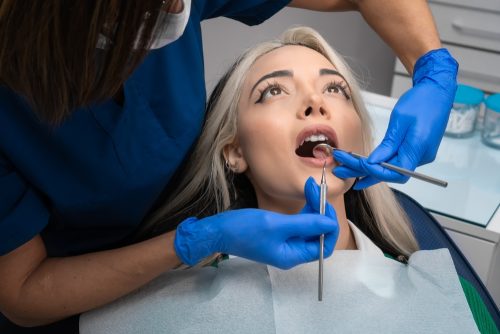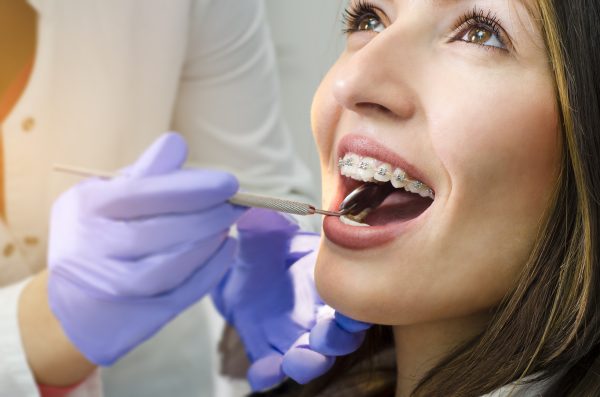Why Dental Health Is Important
Maintaining good dental health is crucial for overall health and well-being. Poor dental hygiene can lead to a wide array of dental problems and even negatively impact other areas of the body. By practicing good dental habits, you can avoid common dental problems and keep your smile healthy and bright.
Learn more about dental health and how to maintain yours by dialing (206)682-3888 and scheduling a consultation with Dr. Robert E. Johnson at Aesthetic Dental Associates.
Proper Oral Hygiene Tips From Dr. Robert E. Johnson
Brushing and Flossing Techniques
Proper brushing and flossing are essential for good dental health. Brush your teeth at least twice a day for two minutes each time, using fluoride toothpaste and a soft-bristled brush. Be sure to brush all surfaces of your teeth, including the fronts, backs, and tops. Don’t forget to brush your tongue, as it can harbor bacteria and cause bad breath.
Flossing helps remove plaque and food particles from between your teeth, where your toothbrush can’t reach. To floss correctly, use a piece of floss about 18 inches long. Wrap the floss around your fingers and gently slide it between your teeth. Curve the floss around each tooth and move it up and down to remove any debris.
Eating Habits and Dental Health
What you eat can have a serious impact on your dental health. Eating a balanced diet that includes plenty of fruits and vegetables can help promote healthy teeth and gums. Foods high in sugar and starch can promote the growth of bacteria that cause cavities and gum disease. Be sure to drink plenty of water to keep your mouth hydrated and rinse away any food particles.
Regular Dental Checkups and Cleanings
Regular dental checkups and professional cleanings are essential for maintaining good dental health. During a dental checkup, your Seattle dentist will examine your teeth and gums for any signs of decay or disease. They may also take X-rays to check for any hidden problems and get a more in-depth idea of the state of your oral health.
Dental cleanings involve removing any built-up plaque and tartar from your teeth, which can help prevent cavities and gum disease. Your Seattle dentist or dental hygienist will use special tools to clean your teeth, paying special attention to areas where a toothbrush and floss normally can’t reach. They may also provide tips for improving your dental hygiene at home.

Common Dental Problems and How to Avoid Them
Cavities and Tooth Decay
Cavities are one of the most common dental problems caused by plaque buildup on teeth. Visible pits or holes in the teeth, dark spots, or stains on the teeth can all be signs of cavities. Those with tooth decay may also experience tooth sensitivity or pain when eating or drinking hot, cold, or sweet foods and drinks.
To avoid cavities, make sure to:
- Brush and floss regularly to remove plaque and prevent bacteria from building up
- Limit sugary and acidic foods and drinks
- Use fluoride toothpaste
- Receiving regular dental checkups and professional cleanings
Tooth decay occurs when the enamel on teeth wears away, leaving them vulnerable to bacteria and decay. Some of the common signs and symptoms of tooth decay include tooth sensitivity or pain when eating or drinking hot, cold, or sweet foods and drinks. You may also notice visible pits or holes in the teeth. Another sign can be bad breath or a bad taste in the mouth.
To avoid tooth decay, it’s important to:
- Brush and floss regularly
- Limit sugary and acidic foods and drinks
- Use fluoride toothpaste
- Receive regular dental checkups and cleanings
Gum Disease
Gum disease, also known as periodontal disease, is caused by untreated plaque buildup that can lead to inflammation, bleeding gums, and tooth loss. Some of the signs and symptoms of gum disease can range from swollen, red, or tender gums to bleeding when brushing or flossing. You may also notice receding gums or teeth that appear longer.
To avoid gum disease, you should:
- Brush and floss regularly
- Schedule regular dental checkups and cleanings with your dentist
- Avoid tobacco products
- Maintain a healthy diet
Tooth Sensitivity
Tooth sensitivity is a common problem that can cause discomfort when eating or drinking hot, cold, or sweet foods and drinks. One of the most common symptoms include pain or discomfort when brushing or flossing. You may also experience aching or throbbing pain in the teeth.
To avoid tooth sensitivity, you can:
- Practice good dental hygiene
- Use a soft-bristled toothbrush
- Limit acidic foods and drinks
- Use fluoride toothpaste
- Avoiding teeth grinding
Bad Breath
Bad breath, also known as halitosis, can be caused by a buildup of bacteria in the mouth, poor dental hygiene, or certain foods and drinks. Persistent bad breath that doesn’t go away after brushing, flossing, or using mouthwash is one of the signs of bad breath. Those with chronic bad breath may notice a persistent bad taste in their mouths, dry mouth, or thick saliva.
To avoid bad breath, it’s important to:
- Practice good dental hygiene and brush and floss regularly
- Drink plenty of water
- Avoid foods and drinks that can cause bad breath, such as garlic and coffee
Take Care of Your Oral Health
Taking care of your teeth and gums is essential for maintaining good oral health and overall well-being. If you’re experiencing any dental problems or haven’t had a checkup in a while, schedule an appointment with our Seattle dentist today by dialing (206)682-3888.
By following the tips and advice recommended by your Seattle dentist you can prevent common dental problems and keep your smile healthy and beautiful for years to come. Aesthetic Dental Associates serves patients from Seattle and surrounding areas.

